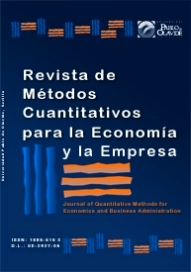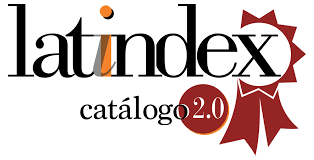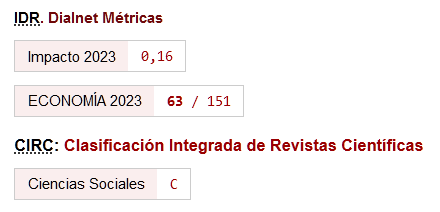Estudio de la Influencia de los Incentivos en la Conducción de Experimentos
DOI:
https://doi.org/10.46661/rev.metodoscuant.econ.empresa.8329Palabras clave:
Finanzas conductuales, Pronóstico Financiero, Heurística de Anclaje y Ajuste, Juicio, Incentivo MonetarioResumen
El uso de incentivos monetarios en los experimentos es objeto de un intenso debate en la literatura académica debido a que no existe un consenso sobre su conveniencia como herramienta para incentivar a los participantes de un experimento, diversos autores lo consideran imprescindible y otros desestiman su uso. En este artículo se estudia la influencia que los incentivos monetarios puedan o no generar en los resultados provistos por los participantes de un experimento.
Para esto, se condujo un experimento a 280 estudiantes universitarios y consistió en pronosticar el valor futuro de un índice financiero. El experimento compuesto por dos fases se aplicó a dos grupos. El grupo uno estuvo conformado por 124 estudiantes a quienes se les ofreció un incentivo monetario por su participación. El grupo dos con 156 estudiantes, quienes se les aplicó el mismo experimento con la diferencia que no se les ofreció incentivo monetario, siendo su participación libre y voluntaria. Esto permitió comparar los resultados de ambos grupos para establecer el grado de influencia del incentivo monetario. Además, como se realizó un pronóstico financiero basado en un valor presente, se midió la influencia de la heurística de anclaje y ajuste al realizar el pronóstico financiero.
Los resultados se analizaron mediante el test no-paramétrico Mann-Whitney y la prueba Chi2. Se concluye que el incentivo monetario no influye en las respuestas de los participantes y se confirmó la influencia de la heurística de anclaje y ajuste en los pronósticos del índice financiero utilizado en el estudio.
Descargas
Citas
Allais, M. (1953). Le Comportement de l'Homme Rationnel devant le Risque: Critique des Postulats et Axiomes de l'Ecole Americaine. Econometrica, 21(4), 503. https://doi.org/10.2307/1907921 DOI: https://doi.org/10.2307/1907921
Araujo, F. A., Carbone, E., Conell-Price, L., Dunietz, M. W., Jaroszewicz, A., Landsman, R., Lamé, D., Vesterlund, L., Wang, S. W., & Wilson, A. J. (2016). The slider task: an example of restricted inference on incentive effects. Journal of the Economic Science Association, 2(1), 1-12. https://doi.org/10.1007/s40881-016-0025-7 DOI: https://doi.org/10.1007/s40881-016-0025-7
Bacon, F. (1762). Novum organum scientiarum. Typis G. Girardi. https://doi.org/10.5962/bhl.title.39005 DOI: https://doi.org/10.5962/bhl.title.39005
Bahrick, H. P. (1954). Incidental learning under two incentive conditions. Journal of Experimental Psychology, 47(3), 170-172. https://doi.org/10.1037/h0053619 DOI: https://doi.org/10.1037/h0053619
Bloomfield, R., & Anderson, A. (2010). Experimental finance. In J. R. Baker, H.K. and Nofsinger (Ed.), Behavioral Finance: Investors, Corporations, and Markets (pp. 113-130). John Wiley & Sons, Inc.
https://doi.org/10.1002/9781118258415.ch7 DOI: https://doi.org/10.1002/9781118258415.ch7
Bonner, S. E., & Sprinkle, G. B. (2002). The effects of monetary incentives on effort and task performance: theories, evidence, and a framework for research. Accountine, Organizations and Society, 27, 303-345. https://doi.org/10.1016/S0361-3682(01)00052-6 DOI: https://doi.org/10.1016/S0361-3682(01)00052-6
Boyle, R. (1661). The sceptical chymist or, Chymico-physical doubts & paradoxes. https://doi.org/10.5479/sil.140935.39088002863561 DOI: https://doi.org/10.5479/sil.140935.39088002863561
Camerer, C., & Hogarth, R. M. (1999). The Effects of Financial Incentives in Experiments: A Review and Capital-Labor-Production Framework. Journal of Risk and Uncertainty, 19(1), 7-42. https://doi.org/10.1023/A:1007850605129 DOI: https://doi.org/10.1007/978-94-017-1406-8_2
Cárdenas, J.C., & Ostrom, E. (2004). ¿Qué traen las personas al juego? Experimentos de campo sobre la cooperación en los recursos de uso común. Revista Desarrollo y Sociedad, 54, 87-132. https://doi.org/10.13043/dys.54.3 DOI: https://doi.org/10.13043/dys.54.3
Cesarini, D., Sandewall, Ö., & Johannesson, M. (2006). Confidence interval estimation tasks and the economics of overconfidence. Journal of Economic Behavior & Organization, 61(3), 453-470. https://doi.org/10.1016/j.jebo.2004.10.010 DOI: https://doi.org/10.1016/j.jebo.2004.10.010
Chamberlin, E. H. (1948). An Experimental Imperfect Market. Journal of Political Economy, 56(2), 95-108. https://doi.org/10.1086/256654 DOI: https://doi.org/10.1086/256654
Czerwonka, M. (2017). Anchoring and Overconfidence: The Influence of Culture and Cognitive Abilities. International Journal of Management and Economics, 53(3), 48-66. https://doi.org/10.1515/ijme-2017-0018 DOI: https://doi.org/10.1515/ijme-2017-0018
Davis, D., & Holt, C. (1993). Experimental Economics. Princeton University Press.
https://doi.org/10.1515/9780691233376 DOI: https://doi.org/10.1515/9780691233376
Deci, E. L. (1971). Effects of externally mediated rewards on intrinsic motivation. Journal of Personality and Social Psychology, 18(1), 105-115. https://doi.org/10.1037/h0030644 DOI: https://doi.org/10.1037/h0030644
Deci, E. L., Koestner, R., & Ryan, R. M. (1999). A meta-analytic review of experiments examining the effects of extrinsic rewards on intrinsic motivation. Psychological Bulletin, 125(6), 627-668. https://doi.org/10.1037//0033-2909.125.6.627 DOI: https://doi.org/10.1037//0033-2909.125.6.627
Descartes, R. (1637). Discours de la Méthode Pour bien conduire sa raison, et chercher la vérité dans les sciences (A. L. de l'imprimerie de J. Maire, Ed.). https://doi.org/ark:/12148/btv1b86069594
Duxbury, D. (2015a). Behavioral finance: insights from experiments I: theory and financial markets. Review of Behavioral Finance, 7(1), 78-96. https://doi.org/10.1108/RBF-03-2015-0011 DOI: https://doi.org/10.1108/RBF-03-2015-0011
Duxbury, D. (2015b). Behavioral finance: insights from experiments II: biases, moods and emotions. Review of Behavioral Finance, 7(2), 151-175. https://doi.org/10.1108/RBF-09-2015-0037 DOI: https://doi.org/10.1108/RBF-09-2015-0037
Eisenberger, R., & Cameron, J. (1996). Detrimental effects of reward: Reality or myth? American Psychologist, 51(11), 1153-1166. https://doi.org/10.1037/0003-066X.51.11.1153 DOI: https://doi.org/10.1037//0003-066X.51.11.1153
Fatás, E., & Roig, J. (2004). Una introducción a la metodología experimental en economía. Cuadernos de Economía: Spanish Journal of Economics and Finance, 27(75), 7-36.
Forsythe, R., Horowitz, J. L., Savin, N. E., & Sefton, M. (1994). Fairness in Simple Bargaining Experiments. Games and Economic Behavior, 6(3), 347-369. https://doi.org/10.1006/game.1994.1021 DOI: https://doi.org/10.1006/game.1994.1021
Friedman, D., & Sunder, S. (1994). Experimental Methods: A Primer for Economists. Cambridge: Cambridge University Press. https://doi.org/10.1017/CBO9781139174176 DOI: https://doi.org/10.1017/CBO9781139174176
Givi, J., & Galak, J. (2019). The "future is now" bias: Anchoring and (insufficient) adjustment when predicting the future from the present. Journal of Experimental Social Psychology, 84(February), 103830. https://doi.org/10.1016/j.jesp.2019.103830 DOI: https://doi.org/10.1016/j.jesp.2019.103830
Gneezy, U., & Rustichini, A. (2000). Pay Enough or Don't Pay at All. Quarterly Journal of Economics, 115(3), 791-810. https://doi.org/10.1162/003355300554917 DOI: https://doi.org/10.1162/003355300554917
Grether, D. M., & Plott, C. R. (1979). Economic Theory of Choice and the Preference Reversal Phenomenon. The Construction of Preference, 69(4), 623-638.
Guala, F. (2005). The Methodology of Experimental Economics. Cambridge University Press. https://doi.org/10.1017/CBO9780511614651 DOI: https://doi.org/10.1017/CBO9780511614651
Hertwig, R., & Ortmann, A. (2001). Experimental practices in economics: A methodological challenge for psychologists? Behavioral and Brain Sciences, 24(3), 383-451. https://doi.org/10.1017/s0140525x01004149 DOI: https://doi.org/10.1017/S0140525X01004149
Heyman, J., & Ariely, D. (2004). Effort for Payment: A Tale of Two Markets. Psychological Science, 15(11), 787-793. https://doi.org/10.1111/j.0956-7976.2004.00757.x DOI: https://doi.org/10.1111/j.0956-7976.2004.00757.x
Jacowitz, K. E., & Kahneman, D. (1995). Measures of Anchoring in Estimation Tasks. Personality and Social Psychology Bulletin, 21(11), 1161-1166. https://doi.org/10.1177/01461672952111004 DOI: https://doi.org/10.1177/01461672952111004
Jenkins, G. Douglas, Jr., Mitra, A., Gupta, N., & Shaw, J. D. (1998). Are financial incentives related to performance? A meta-analytic review of empirical research. Journal of Applied Psychology, 83(5), 777-787. https://doi.org/10.1037/0021-9010.83.5.777 DOI: https://doi.org/10.1037//0021-9010.83.5.777
Kahneman, D., & Peavler, W. S. (1969). Incentive effects and pupillary changes in association learning. Journal of Experimental Psychology, 79(2, Pt.1), 312-318. https://doi.org/10.1037/h0026912 DOI: https://doi.org/10.1037/h0026912
Kinari, Y. (2016). Properties of expectation biases: Optimism and overconfidence. Journal of Behavioral and Experimental Finance, 10(1), 32-49. https://doi.org/10.1016/j.jbef.2016.02.003 DOI: https://doi.org/10.1016/j.jbef.2016.02.003
Kohn, A. (1993). Why Incentive Plans Cannot Work. Harvard Business Review, 71, 54-63. https://doi.org/10.1097/00019514-199400001-00011 DOI: https://doi.org/10.1097/00019514-199400001-00011
Krug, M. K., & Braver, T. S. (2014). Motivation and Cognitive Control: Going Beyond Monetary Incentives. In The Psychological Science of Money (pp. 137-162). Springer New York. https://doi.org/10.1007/978-1-4939-0959-9_7 DOI: https://doi.org/10.1007/978-1-4939-0959-9_7
Ladrón de Guevara-Cortés, R., Gómez Mejía, A., Peña Vargas, V. A., & Madrid Paredones, R. M. (2020). Influencia del nivel de avance educativo y el género en la toma de decisiones financieras: una aproximación desde la Prospect Theory. Revista Finanzas y Política Económica, 12(1), 19-54. https://doi.org/10.14718/revfinanzpolitecon.v12.n1.2020.3092 DOI: https://doi.org/10.14718/revfinanzpolitecon.v12.n1.2020.3092
Meloy, M. G., Russo, J. E., & Miller, E. G. (2006). Monetary Incentives and Mood. Journal of Marketing Research, 43(2), 267-275. https://doi.org/10.1509/jmkr.43.2.267 DOI: https://doi.org/10.1509/jmkr.43.2.267
Murayama, K., Matsumoto, M., Izuma, K., & Matsumoto, K. (2010). Neural basis of the undermining effect of monetary reward on intrinsic motivation. Proceedings of the National Academy of Sciences, 107(49), 20911-20916. https://doi.org/10.1073/pnas.1013305107 DOI: https://doi.org/10.1073/pnas.1013305107
Peña, V. A., & Gómez-Mejía, A. (2020). Effect of heuristic anchoring and adjustment, and optimism bias, in stock market forecasts. Revista Finanzas y Política Económica, 11(2), 389-409. https://doi.org/10.14718/revfinanzpolitecon.2019.11.2.10 DOI: https://doi.org/10.14718/revfinanzpolitecon.2019.11.2.10
Pompian, M. (2012). Behavioral Finance and Wealth Management: How to Build Optimal Portfolios That Account for Investor Biases (2nd ed.). John Wiley & Sons.
https://doi.org/10.1002/9781119202400 DOI: https://doi.org/10.1002/9781119202400
Pompian, M. (2021). Behavioral finance and your portfolio: a navigation guide for building wealth. Wiley.
Read, D. (2005). Monetary incentives, what are they good for? Journal of Economic Methodology, 12(2), 265-276. https://doi.org/10.1080/13501780500086180 DOI: https://doi.org/10.1080/13501780500086180
Roth, A. E. (1993). The Early History of Experimental Economics. Journal of the History of Economic Thought, 15(2), 184-209. https://doi.org/10.1017/S1053837200000936 DOI: https://doi.org/10.1017/S1053837200000936
Ryan, R. M., & Deci, E. L. (2000). When rewards compete with nature. In Intrinsic and Extrinsic Motivation (pp. 13-54). Elsevier. https://doi.org/10.1016/B978-012619070-0/50024-6 DOI: https://doi.org/10.1016/B978-012619070-0/50024-6
Smith, V. (1976). Experimental Economics: Induced Value Theory. American Economic Review, 66(2), 274-279.
Smith, V. (1982). Microeconomic Systems as an Experimental Science. The American Economic Review, 72(5), 923-955.
Smith, V. (1994). Economics in the Laboratory. Journal of Economic Perspectives, 8(1), 113-131. https://doi.org/10.1017/CBO9780511819025.023 DOI: https://doi.org/10.1257/jep.8.1.113
S&P Global. (2019). S&P MILA Indices Methodology. https://us.spindices.com/documents/methodologies/methodology-sp-mila-indices.pdf?force_download=true
Thaler, R. H. (1986). The Psychology and Economics Conference Handbook: Comments on Simon, on Einhorn and Hogarth, and on Tversky and Kahneman. The Journal of Business, 59(S4), S279. https://doi.org/10.1086/296366 DOI: https://doi.org/10.1086/296366
Theocharis, Z., Smith, L. A., & Harvey, N. (2018). The influence of graphical format on judgmental forecasting accuracy: Lines versus points. Futures & foresight science, e7. https://doi.org/10.1002/ffo2.7 DOI: https://doi.org/10.1002/ffo2.7
Thurstone, L. L. (1931). The Indifference Function. The Journal of Social Psychology, 2(2), 139-167. https://doi.org/10.1080/00224545.1931.9918964 DOI: https://doi.org/10.1080/00224545.1931.9918964
Thye, S. R. (2014). Logical and Philosophical Foundations of Experimental Research in the Social Sciences. In Laboratory Experiments in the Social Sciences (pp. 53-82). Elsevier. https://doi.org/10.1016/B978-0-12-404681-8.00003-0 DOI: https://doi.org/10.1016/B978-0-12-404681-8.00003-0
Tversky, A., & Kahneman, D. (1974). Judgment under Uncertainty: Heuristics and Biases. Science, 185(4157), 1124-1131. https://doi.org/10.1126/science.185.4157.1124 DOI: https://doi.org/10.1126/science.185.4157.1124
Tversky, A., & Kahneman, D. (1986). Rational Choice and the Framing of Decisions. The Journal of Business, 59(S4), S251. https://doi.org/10.1086/296365 DOI: https://doi.org/10.1086/296365
Vignais, P. V., & Vignais, P. M. (2010). Discovering Life, Manufacturing Life. In Discovering Life, Manufacturing Life. Springer Netherlands. https://doi.org/10.1007/978-90-481-3767-1 DOI: https://doi.org/10.1007/978-90-481-3767-1
Vinogradov, D., & Shadrina, E. (2013). Non-monetary incentives in online experiments. Economics Letters, 119(3), 306-310. https://doi.org/10.1016/j.econlet.2013.03.014 DOI: https://doi.org/10.1016/j.econlet.2013.03.014
Von Neumann, J., & Morgenstern, O. (1944). Theory of Games and Economic Behavior. In Princeton University Press.
Descargas
Publicado
Cómo citar
Número
Sección
Licencia
Derechos de autor 2024 Victor Pena, Rogelio Ladrón de Guevara Cortés, Alina Gómez Mejía, Jorge Enrique Velasco Díaz

Esta obra está bajo una licencia internacional Creative Commons Atribución-CompartirIgual 4.0.
El envío de un manuscrito a la Revista supone que el trabajo no ha sido publicado anteriormente (excepto en la forma de un abstract o como parte de una tesis), que no está bajo consideración para su publicación en ninguna otra revista o editorial y que, en caso de aceptación, los autores están conforme con la transferencia automática del copyright a la Revista para su publicación y difusión. Los autores retendrán los derechos de autor para usar y compartir su artículo con un uso personal, institucional o con fines docentes; igualmente retiene los derechos de patente, de marca registrada (en caso de que sean aplicables) o derechos morales de autor (incluyendo los datos de investigación).
Los artículos publicados en la Revista están sujetos a la licencia Creative Commons CC-BY-SA de tipo Reconocimiento-CompartirIgual. Se permite el uso comercial de la obra, reconociendo su autoría, y de las posibles obras derivadas, la distribución de las cuales se debe hacer con una licencia igual a la que regula la obra original.
Hasta el volumen 21 se ha estado empleando la versión de licencia CC-BY-SA 3.0 ES y se ha comenzado a usar la versión CC-BY-SA 4.0 desde el volumen 22.










